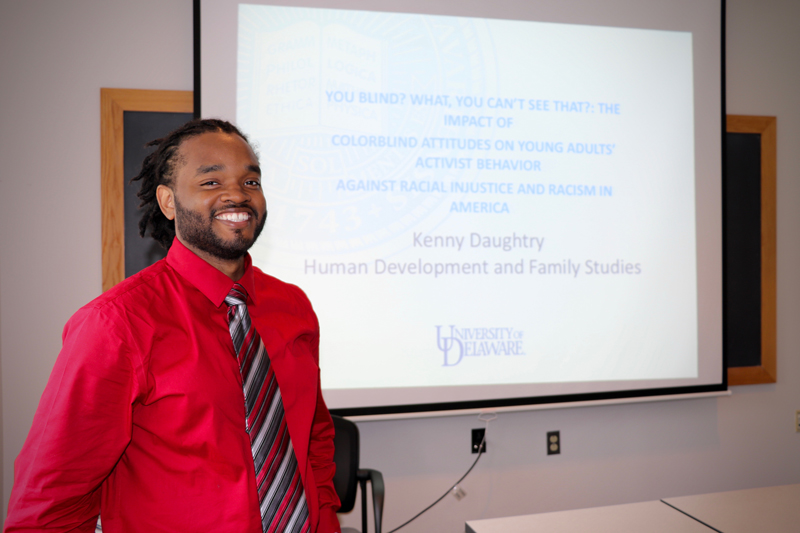


Do you see skin color?
Photo by Elizabeth Adams February 21, 2020
UD doctoral student’s research explores the intersection of racism and activism
Have you ever heard a well-meaning person say, “I don’t see skin color,” and wondered if that person sees you? Is it just an empty phrase filled with good intentions? Or does using this phrase support systemic oppression?
The notion of colorblindness may sound good in theory, like some kind of unifying idea for a post-racial America. However, attitudes like this perpetuate racism, according to research by Kendell Daughtry, who is completing his doctoral studies in the Department of Human Development and Family Sciences (HDFS) at the University of Delaware.
“Colorblind attitudes give people the idea that race doesn’t matter — that race is not a factor in education, jobs or the justice system,” said Daughtry. “Because if people can’t ‘see skin color,’ then they won’t see that there is discrimination because of skin color.”
In a study published in 2019 in the Journal of African American Studies, Daughtry surveyed 222 people between the ages of 18 and 35 to learn more about how individuals self-identify with their own ethnic group — i.e., do they “see color” — and how this decision affects attitudes toward racial injustice. Coauthored with HDFS faculty Valerie Earnshaw, Robin Palkovitz and Bahira Trask, the study asked participants approximately 40 questions, and the pool of respondents was narrowed to only those who had completed at least six years of schooling in the United States.
Daughtry discovered a positive correlation between color blindness and a form of racism known as “social dominance orientation,” which is a measure widely used by social scientists to determine a person’s preference for social hierarchies. The less support a person exhibits for group equality, the stronger that person’s social dominance orientation.
“So if I’m adhering to this colorblind attitude — even unknowingly — then I am allowing racism to continue because I don’t see color,” said Daughtry.
Conversely, participants who scored low in color blindness were more likely to exhibit activist behaviors that raise awareness of issues related to racial and social justice.
Daughtry also found these behaviors were more prevalent among some ethnic groups than others. White participants were more likely to exhibit colorblind attitudes and social dominance orientation, whereas non-white participants were more likely to self-identify with their own ethnic group and engage in activist behaviors.
In other words, when someone believes that skin color does not play a role in such things as racial privilege or institutional discrimination, then that person is less likely to engage in activities that promote racial justice, such as protests and other forms of activism.
“If people are not active in the fight against racism then they could be considered part of the problem, for inactivity allows for racism to continue,” said Daughtry. “Activism Is not displayed in any exclusive manner. It is essential for people to find which mode of activism they are willing to engage in and do it.”
This study is part of Daughtry’s broader doctoral research agenda in critical race theory, social attitudes and activism. Working with Roderick Carey, assistant professor in HDFS, Daughtry’s doctoral dissertation will examine how race, gender and ethnic identities in the U.S. Virgin Islands affect young people’s sense of self-worth.
“Kenny is an astounding thinker, an impactful teacher, passionate speaker, and an effective equity-minded and justice-oriented scholar activist,” said Carey. “I'm sure that whatever emerges from his study will be insightful and field-bending.”
Daughtry has also had the opportunity to bring his research into the classroom. He designed a new course – HDFS267, Diversity and Self-Awareness – that was offered at UD for the first time in the fall of 2018. The course offered undergraduates an introduction to racial literacy that fostered a semester-long dialogue on race in America.
Talking about race can be difficult, Daughtry acknowledges, especially for white people who are reticent to reflect on the privileges they enjoy because of the color of their skin. Unfortunately, when white people pretend to not “see color,” they’re missing out on opportunities to learn more about racial justice. In his course, Daughtry worked with students to better understand institutional racism and process their white fragility.
“We need to promote healthy conversations around race that give people an opportunity to process their emotions, take responsibility for their racial attitudes and break down systemic racism in this country,” said Daughtry. “Activism is important, but if we’re colorblind — if we don’t see color — then we’re not owning our responsibility.”
Contact Us
Have a UDaily story idea?
Contact us at ocm@udel.edu
Members of the press
Contact us at 302-831-NEWS or visit the Media Relations website

